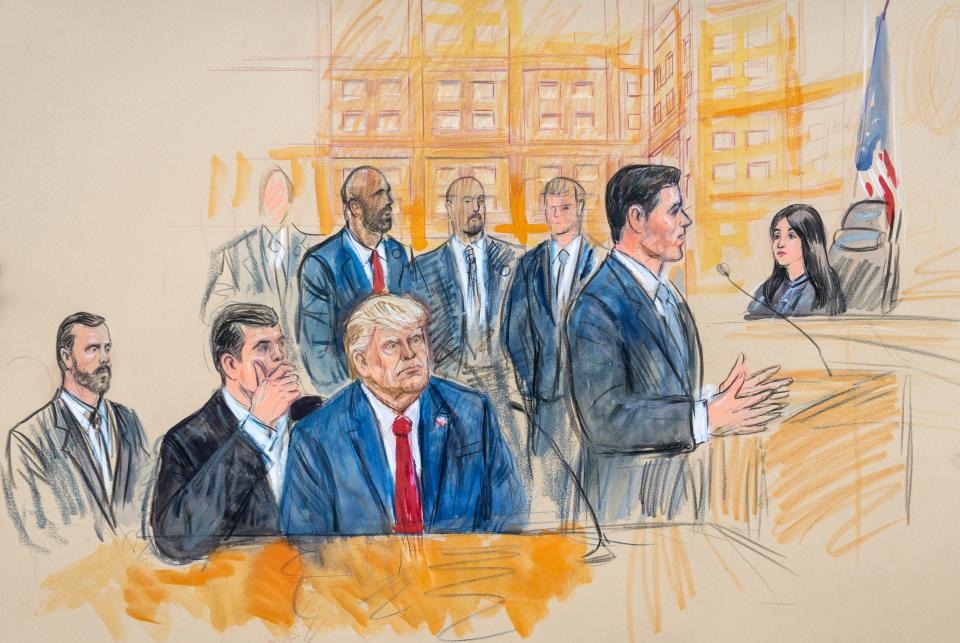Magistrate Judge Moxila A. Upadhyaya warned Trump before he left court. Here's what stood out
- Oops!Something went wrong.Please try again later.
WASHINGTON – The extraordinary arraignment of former President Donald Trump on federal charges related to his alleged efforts to overturn the 2020 presidential election concluded with a few ordinary warnings from the judge presiding over the hearing, but one stood out.
U.S. Magistrate Judge Moxila A. Upadhyaya allowed Trump to depart his second arraignment in federal court on Thursday without travel restrictions or a cash bond. But before he left, Upadhyaya informed the former president of his conditions of release and cautioned him against violating the conditions.
She also set Aug. 28 as the date of the next court hearing in the case.

The warnings issued by Upadhyaya were similar to the conditions of release set by a judge in Miami federal court, where Trump pleaded not guilty to criminal charges related to his alleged mishandling of classified documents recovered from his Florida resort.
One to refrain from pressuring witnesses has received extra attention.
Here are three takeaways from the warnings issued to Trump at his arraignment in Washington:
Don't discuss the case with witnesses
Trump was also told that he is prohibited from discussing the criminal case with anyone known to be a witness.
The judge said, however, that Trump could potentially communicate with a witness in the case through legal counsel or in the presence of his attorney.
Upadhyaya also reminded the former president that it is a crime to intimidate a witness or attempt to retaliate against anyone who might provide testimony.
"It is a crime to try to influence a juror or to threaten or attempt to bribe a witness or any other person who may have information about your case, or to retaliate against anyone for providing information about your case to the prosecution, or to otherwise obstruct the administration of justice," Upadhyaya said to Trump.
This one is notable because a top member of the House committee investigating Jan. 6 last year said Trump tried to call one of the panel’s witnesses. The unnamed witness was later identified as a White House support staffer.
Why it matters and how it connects to Jan. 6
Former Rep. Liz Cheney, R-Wyo., the committee’s vice chair, said the alleged incident was referred to the Justice Department as possible evidence of witness tampering.
Cheney also said the committee regularly asked witnesses if they had been contacted by any former colleagues who attempted to influence or impact their testimony, and she offered multiple examples during committee hearings last summer.
“What they said to me is as long as I continue to be a team player, they know I’m on the team, I’m doing the right thing, I’m protecting who I need to protect, you know, I’ll continue to stay in good graces in Trump World,” one witness said.
In another example, a witness told the committee: “(A person) let me know you have your deposition tomorrow. He wants me to let you know that he’s thinking about you. He knows you’re loyal, and you’re going to do the right thing when you go in for your deposition.”
The panel did not identify that witness, but The New York Times reported that bombshell witness Cassidy Hutchinson, a Trump White House aide, had received the contact, prompting the Jan. 6 committee to move up the hearing featuring her public testimony.
Don't commit more criminal offenses
As Trump leaned over the table grim-faced with his hands folded, Upadhyaya told the former president that the most important condition of his release is that he does not commit any additional federal, state, or local offenses.
Upadhyaya warned Trump that committing additional criminal offenses could result in his release being revoked.
While Trump could possibly face his fourth indictment in the state of Georgia related to an investigation into electoral interference in the 2020 presidential race, criminal charges in Georgia are unlikely to violate this condition of release.
The warning issued by Upadhyaya likely only applies to the criminal offenses committed after the court hearing, so an indictment in Georgia would not mean Trump failed to comply with his conditions of release.
Appear in court, if so ordered
Trump was also reminded that he must show up to court if ordered by a judge to do so.
Upadhyaya reminded the former president that he could face additional criminal charges for failing to appear in court.
The former president, however, will not need to appear at the federal courthouse in Washington for the next hearing in the case on Aug. 28. The judge told Trump that she would waive his appearance at the next hearing if he is represented by legal counsel.
Kevin Johnson contributed to this report.
This article originally appeared on USA TODAY: Judge Moxila A. Upadhyaya gives Trump warnings. One stands out.

